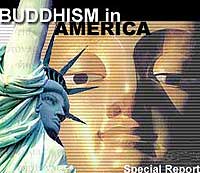Measuring Buddhist Influence in America
Originally published on Tricycleblog, Sept 24, 2004, The Buddhist Channel, Feb 14,
New York, USA -- The current issue of the Journal for the Scientific Study of Religion includes one of the most important pieces on Buddhism in America to appear in recent years. "Buddhists and Buddhism in the United States: The Scope of Influence," was written by sociologist of American religion Robert Wuthnow and ethnographer of Theravada in the USA Wendy Cadge.
 Wuthnow and Cadge?s study is significant for two reasons. First, it takes a different tack in assessing the importance of Buddhism in America than most works have. And secondly, it provides hard data to back up its assertions. This is an article that will be read and cited by scholars of American Buddhism for years to come.
Wuthnow and Cadge?s study is significant for two reasons. First, it takes a different tack in assessing the importance of Buddhism in America than most works have. And secondly, it provides hard data to back up its assertions. This is an article that will be read and cited by scholars of American Buddhism for years to come.
The approach which Wuthnow and Cadge take is to assess the level of influence that Buddhism has exerted on religious Americans, rather than the more conventional numbers game of trying to determine exactly how many Buddhists there are in the country. This is a much more productive approach because Buddhism, unlike Christianity, is not founded on an adherence model: Buddhism can be and often is practiced as part of a wider range of religious commitments.
This means that the number of people who identify overtly as Buddhists doesn?t tell us much about whether Buddhism is impacting American religion generally, particularly because many people who regularly attend Buddhist temples and meditation centers do not consider themselves explicitly Buddhist. Within Buddhist circles, this phenomenon has been noted for some time: approximately 50% of Tricycle?s readership, for instance, doesn?t self-identify as Buddhist.
Historian of American religions Thomas Tweed has coined the term ?nightstand Buddhists? for people who might read a Buddhist book before bed or perform some meditation in the morning, but aren?t connected to Buddhism as an institutional religion?such people are usually left out of quantitative studies that attempt to gauge the number of Buddhists out there. So in reframing the question, Wuthnow and Cadge have found a better avenue of investigation that comes closer to capturing the real situation of Buddhism in America.
And what did they find? Even for the specialist in the field of American Buddhism, the numbers Wuthnow and Cadge came up with will prove surprising. Based on their survey conducted in 2002-2003, they found that one out of every seven Americans has had at least a fair level of contact with Buddhism, and that one out of eight Americans reported that Buddhism had influenced their religious life. Those are staggeringly high numbers. To put it in perspective, there are about four million Americans who actively identify as Buddhists. But if we ask how many Americans include Buddhist elements?a little or a lot?in their personal spiritual lives, the number appears to be about 12.5% of the population: that?s 26,125,000 adults. The number who say the Buddhist influence has been significant is almost the same: at 12%, that?s 25,080,000. Clearly Buddhism is exerting an influence far beyond the relatively small number of people who claim Buddhism as their primary religious identity.
There?s another lesson to be learned between the lines. The number of Americans who have had at least a fair amount of contact with Buddhism is 14%, or 29,260,000 adults. The gap between those who have encountered Buddhism, and those who have adopted some Buddhist elements into their lives, is small. Using Wuthnow and Cadge?s figures, we learn that 87.5% of people who have encountered Buddhism believe it has had an effect on them, and 85.7% report a substantial impact. Not surprising, Buddhism scored high with positive assessments, with many more people reporting positive associations with Buddhism than negative ones. In other words, whenever Americans have come into contact with Buddhism?and the study shows that this is a much larger number than might have been guessed?they have overwhelmingly reacted favorably and incorporated elements of it into their religious thinking or practice.
Extrapolating further, a scenario of ever-increasing Buddhist influence within American religious life can be discerned. Even a casual observer will quickly concede that the amount of Buddhist materials available to the public is far higher today than ever before, and growing steadily every year. Buddhist temples continue to be founded across the country, and Buddhist elements in movies, television, books, and online are becoming more common. And since Buddhism appears to exert an influence on virtually everyone who comes in contact with it (and a positive one at that), the widespread penetration of Buddhism into American religion and culture appears to be a coming certainty.

 Wuthnow and Cadge?s study is significant for two reasons. First, it takes a different tack in assessing the importance of Buddhism in America than most works have. And secondly, it provides hard data to back up its assertions. This is an article that will be read and cited by scholars of American Buddhism for years to come.
Wuthnow and Cadge?s study is significant for two reasons. First, it takes a different tack in assessing the importance of Buddhism in America than most works have. And secondly, it provides hard data to back up its assertions. This is an article that will be read and cited by scholars of American Buddhism for years to come.